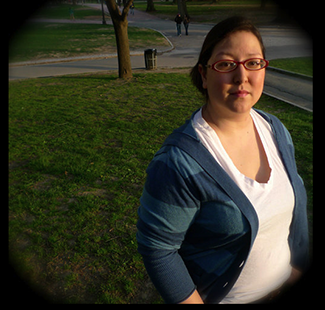A face for activism
Keiko Zoll ’04 is one of the 7.3 million people in this country afflicted with infertility. But rather than let that diagnosis define her, Zoll has become an inspiration and advocate for the many who aren’t yet ready to publicly share their infertility stories.

Keiko Zoll '04

It had been more than a year since Keiko Zoll ’04 received the diagnosis she never wanted. Dressed casually in a blue-striped cardigan, jeans, and flip-flops, she headed to Boston Common, dry-erase board and black marker in hand. While her husband manned the camera and a group of children frolicked in the playground behind her, Zoll looked straight into the camera and used that board and marker to silently pose serious questions related to her life-changing diagnosis: What if I stop defining myself by my infertility? What if I lived in the moment rather than living in an uncertain future? What if my story can help millions?
That last one was especially prescient. In only a week, the video that had taken Zoll 10 hours to shoot and eight more to edit had been viewed 10,000 times. That number has since climbed to more than 31,000—plus 325,000 loads in more than 150 countries. It has appeared on clinical and counseling Web sites, and grabbed the attention of high-profile infertility doctors and specialists across the country. It even led to an award for Best Viral Video from RESOLVE: The National Infertility Association.
“I’d always heard about videos going viral, but this was the first time I could comprehend what that impact was like,” Zoll says. “I got very caught up in the creative aspect of the project, and it didn’t really hit me until a week afterward that I’d leant my face and name to this story.”
Only a year earlier, in March 2009, Zoll had learned that the worst-case scenario, the one that seemed only a distant possibility when her doctor first mentioned it, had happened. “I knew when I had my blood work done that premature ovarian failure—commonly referred to as premature menopause—was one of those super-extreme possibilities,” she says, “ but when I got that e-mail and that [diagnosis] was mine, I was like, ‘Woah. Hold on here.’”
She left her office immediately, headed to her on-campus apartment at Tufts University, and called her husband, sobbing the news into the phone and adding, “Here’s what it comes down to: I can’t have my own genetic children.”
As she spent the next few months confirming the diagnosis through more tests and doctors’ visits, Zoll began blogging about her experience. Going by Miriam (her Hebrew name), she wrote about everything—her hopes and fears, fights with her husband, even conversations with her therapist. Eventually, she decided to reveal her true identity, both on her blog and in her award-winning video. It was a step many women in the infertility community have not been able to take.
“There’s a certain stigma, but it’s even broader than that—it’s a cultural silencing,” Zoll says. “If it happens in the bedroom, we don’t really want to talk about it, but the fact of the matter is, [infertility] affects 7.3 million people in this country. Diseases like breast cancer or diabetes have their walks and their fundraisers, but where is our ribbon? Where is our national event?”
While Zoll says she started out as simply “an advocate for myself,” she soon realized that through the popularity of her blog and video she had become an inspiration for the many women who weren’t yet ready to publicly share their infertility stories.
Evelina Sterling, president of the women’s health nonprofit Rachel’s Well, describes Zoll as “a wonderful patient advocate, bringing attention to often under-recognized and stigmatized health issues.” She adds, “Through her honesty and openness, she has shown many women (and men) that they are not alone. Additionally, she has prompted them to become their own advocates and speak out with regard to their own experiences with infertility. We definitely need more people like Keiko to show the world what a huge issue infertility is.”
Zoll now serves as a board member for RESOLVE’s New England chapter, and has begun collaborating with Sterling and Rachel’s Well. She says her blogging and video work have been “emotionally healing and spiritually healing”—so much so that a prominent infertility doctor and researcher from the National Institutes of Child and Human Development took note and contacted her. He told her that the coping and healing she’d accomplished in only a few short years was something that took other patients much longer to achieve.
“He basically wanted to ask me what my secret way,” she says. “I didn’t have an answer for him; I still don’t.”
Zoll says she hopes to write a book about her experience with infertility and POF—but first needs to find out what the last chapter will hold.
“My husband and I have talked about adoption, and we’ve recently put donor egg IVF back on the table,” she says. “I’m hoping to finish this story by coming out on the other side.”
What IF from Keiko Zoll on Vimeo.
Posted on April 13, 2011

